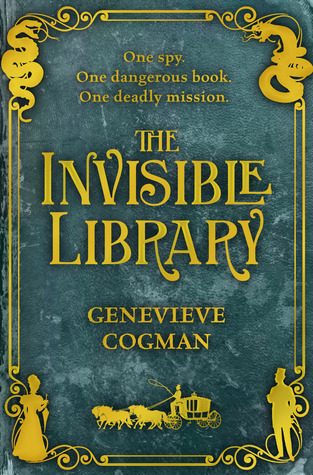Author bio:
----------------------------------
Hi Genevieve,
welcome over at The Book Plank and for taking your time to answer these few
questions for us.
BP: First off could
you give us a short introduction as to who Genevieve Cogman is? What do you do
besides writing; hobbies, likes and dislikes?
GC: I’m a clinical
classifications specialist and cross-mapper: I work for the HSCIC, and my work
involves the ICD-10 and OPCS-4 classifications. My hobbies include patchwork
and quilting, beadwork, roleplaying games and computer games, and of course
reading. I tend to sleep in at weekends, for some reason. :-)
BP: The Invisible
Library is your debut, before this you wrote for several role playing video
games. When and where did you decide that you want to become an author?
GC: Firstly, a
quick correction: I didn’t write for roleplaying video games, I wrote for the
pen-and-paper round-the-table sort of roleplaying games – Exalted, GURPS, In
Nomine, and others.
Secondly, I didn’t
actually plan to become an author and go round with the intention of “today I
will become an author”. I wrote to amuse myself at first, then to amuse others
– fanfiction, filk songs, then my own original fiction – and have been for, um,
twenty years or so. It’s only just now that I’ve made my debut as an author.
BP: Writing a debut
can be a daunting task, how did you go about and start writing The Invisible
Library?
GC: I started
writing it several years ago, when I had the idea for a secret agent collecting
books for an interdimensional library. Some details were planned from the
beginning, while others got developed or created as it went along. Then I had
to go back and tidy the whole sprawling thing up and make it into a coherent
narrative.
BP: Did your
background in writing for roleplaying games help when you were writing The Invisible
Library?
GC: Yes, I think it did: it helped me plan the
cosmological structure of the Library and the alternate worlds, and gave me
some idea of where I wanted the heroine’s “power level” to be in the grand
scheme of things. It also helped me get used to being edited!
BP: A time
travelling librarian is pretty cool! What gave you the idea behind the story of
The Invisible Library?
GC: I think a lot
of people before me have had the idea of hidden libraries, or libraries that
connected multiple worlds: Terry Pratchett, Neil Gaiman… I’m standing on the
shoulders of giants.
BP: The Invisible
Library is out this January, if you would have to sell your book with a single
sentence how would it go?
GC: Love books,
save the universe.
BP: If you were
allowed to make one final adjustment before the book is published, would you do
so? If yes, which part and why?
GC: I can’t think
of anything specific that I’d change. Sorry!
BP: Did you
encounter any specific problems when you were writing The Invisible Library?
GC: Nothing really
specific, I’m afraid. Just sit down, write, write some more, make changes,
write some more.
BP: What was the
hardest part in writing The Invisible Library?
GC: I think the
hardest bit was when my editor pointed out a structural flaw in the story and I
had to go back and make changes to fix it.
BP: Besides the
hardest part, which chapter, scene or character did you enjoy writing about the
most?
GC: I think
Silver’s dialogue was the most entertaining to write. There’s just something
about a character who enjoys living up to the stereotype. (Or possibly down to
it, in his case.)
BP: You have sold
three books in The Invisible Library series to Tor, do you have any other
projects that you wish to pursue in the near future?
GC: Nothing
immediate – I do have some half-formed ideas, but at the moment writing on the
Library series and holding down the day job are taking up all my time and
focus. (Well, I do have a plan for making a quilt based on the Invisible
Library, but that’s probably not what you’re thinking of.)
BP: Everyone enjoys
fantasy and science fiction in their own way, what do you like most about it?
GC: I don’t really
have a specific thing I could put my finger on. It might be the scope: after
all, I enjoy books from a wide range of settings, from Star Trek and Bujold and
Ann Leckie to Scott Lynch and Naomi Novik and Roger Zelazny. There’s room for
everything.
BP: If you would
have to give your top 5 favorite books, which would they be?
GC: I’m not sure –
there are so many I like. Tolkien’s _Lord of the Rings_ would definitely be in
there, though.
BP: And just
lastly, can you give us a sneak peek of what will be in store for the readers
of The Invisible Library and possible the sequel?
GC: Irene gets to
go on an exotic holiday to foreign places – train rides, boat trips, and visits
to the opera. Really. Would I lie?
BP: Thank you very
much for your time Genevieve and good luck with your future projects!
GC: Thank you very
much, and I hope you enjoy the future books too.


Comments
Post a Comment